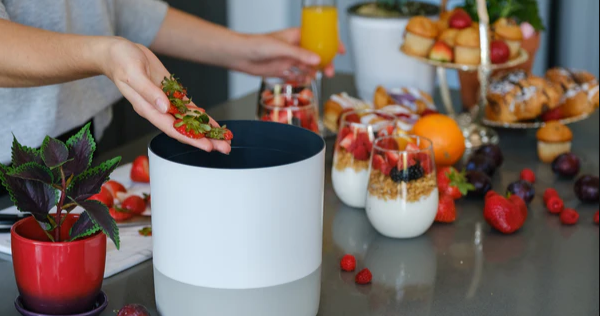Home » Making it easier to go green
Making it easier to go green

Reducing our environmental impact and combating climate change requires more than bringing reusable bags to the store or using paper straws. Finding more sustainable alternatives to many of our daily activities, which drive the majority of energy and water usage in our homes, is critical to making an impact for future generations.
We spoke with two Communitech member companies who are helping create a more sustainable future with their cleantech innovations.
Making showers sustainable
Those long, hot showers might feel great to you, but they use significant energy and water. The average Canadian uses almost 117 litres of water for each shower and 8.5kW of energy in a ten-minute shower.
Reducing energy and water usage is the mission of Kelowna-based RainStick Shower. The startup has developed a circular shower system that sanitizes and reuses shower water to conserve resources while providing higher water pressure than traditional showers. Alisha McFetridge, CEO of Rainstick, says its showers can save up to 80 per cent of water and energy without compromising the showering experience.
“Historically, sustainable technologies and sustainable products have always had some level of compromise on the experience. People almost expect that compromise, so our customer education focuses on showing them that Rainstick gives them a better shower experience and reduces their energy and water usage,” McFetridge said.
Sustainable solutions like Rainstick do have higher initial costs than traditional solutions. They also have long-term cost savings that can deliver a quick return on investment. McFetridge says conversations with potential customers are an educational opportunity to help them understand how the technology works and the cost savings that come from a RainStick Shower.
“Most people don't know how much they pay for their water, utility hookups and surcharges. So, when we tell them the system will pay them back within five years, they still don’t believe us. Once they look at their bills and do their own calculations, they get it,” she said.
Rainstick is gaining popularity in regions with high utility costs, including British Columbia and California. These are areas that have a high adoption rate of similar sustainable solutions.
“We're in this place now, where people are investing in solar energy and electric vehicles, and now are asking what other sustainable technologies are available,” McFetridge said.
Replacing existing showers is only part of Rainstick's go-to-market strategy. The startup is also working with multi-residential property builders and hotels to install Rainstick showers in new developments and renovations of existing properties.
“We're working with a hotel in Southern California that’s going through a renovation right now. When it comes down to an apples-to-apples comparison, Rainstick really comes ahead in the lifetime of the asset and its operating costs. You're saving on water and energy constantly and delivering an overall better experience with that luxurious flow rate that everybody misses, especially in places where the regulated flow rate is under two gallons per minute,” she said.
Rainstick’s circular process makes it part of the trend toward our homes, businesses, and other buildings becoming closed-loop systems. McFetridge is excited to see this trend become a reality.
“I love water technology and seeing what’s out there. Atmospheric water generation and rainwater catchment technologies are growing, but that’s only the beginning. Thinking about how to make our lifestyles more closed-loop and sustainable is something we should all do,” McFetridge said.
The next generation of green bins
Waste management agencies across the country are constantly looking for sustainable solutions to prolong the lives of landfills. Waste to Resource Ontario estimated that the province will exhaust its current landfill capacity by 2032, and new landfills are expensive and attract opposition from residents.
Green bin programs that separate organic waste from other refuse have helped prolong the life of many landfills, including the landfill at the Waterloo Region Waste Management Erb St. facility. However, while green bin programs are making an impact, they still require weekly curbside collection, which makes it challenging to meet carbon emission reduction targets.
Ottawa-based Food Cycle Science is helping municipalities increase the efficiency of their green bin programs with FoodCycler. The countertop-size appliance uses a Vortech-powered grinding system to reduce food waste volume by up to 90 per cent. Instead of sending a full green bin for composting, FoodCycler produces a nutrient-rich amendment that can be used as a fertilizer for home gardens.
While consumers are a target market for FoodCycler, CEO Bradley Crepeau said the startup has found tremendous success working directly with municipalities to replace traditional green bins with FoodCyler units.
“We have 130 partner municipalities that are implementing FoodCyler as an alternative to a curbside collection program in their city. If you were to move to Nelson, British Columbia tomorrow and buy a house, your house would come with one of these units,” Crepeau said.
Like Rainstick, convincing users that FoodCyler is more cost-effective and delivers a better experience is one of the most significant challenges for adoption. Crepeau said that while technology is important to combating climate change, it’s only part of the solution.
“No amount of technology is going to fix this problem. We're going to need to see some form of behavioural change to get ahead of it. That can come in a number of ways. At one end of the spectrum, we've got people wasting less food. It's certainly going to take a lot of spokes in the wheel to tackle this. We aspire to be one of them,” he said.
One of the driving forces behind the design of FoodCyler is a focus on convenience. Crepeau said that cleantech alternatives need to be as or more convenient than their traditional counterparts to change consumer behaviour.
“When you look at the status quo today, in some cases it’s tossing in the garbage for free. We have to be better than that. We looked at the pain points that come with food waste, notably odour and pests. It's an inconvenient problem, and we can offer something that is a better alternative that justifies making an investment into what we believe is a more sustainable solution,” Crepeau said. “When you look at sustainable tech, too often, companies in this space expect the consumer to pay more because it's sustainable. That needs to change. If we're to expect mass adoption, we need to be better as product developers and sustainable tech companies in saying, ‘Not only is this better for the environment, but it's better for your lifestyle and your pocketbook.’”
Communitech
https://communitech.ca
"Communitech helps tech-driven companies start, grow and succeed. Communitech was founded in 1997 by a group of entrepreneurs committed to making Waterloo Region a global innovation leader. At the time it was crazy talk, but somehow this community managed to pull it off. Today, Communitech is a public-private innovation hub that supports a community of more than 1400 companies — from startups to scale-ups to large global players. Communitech helps tech companies start, grow and succeed in three distinct ways: - Communitech is a place – the center of gravity for entrepreneurs and innovators. A clubhouse for building cool shit and great companies. - Communitech delivers programs – helping companies at all stages with access to capital, customers and talent. We are here to help them grow and innovate. - Communitech partners in building a world-leading ecosystem – making sure we have all the ingredients (and the brand) to go from a small startup to a global giant."


